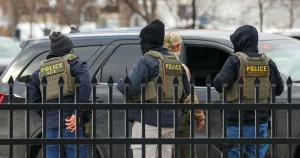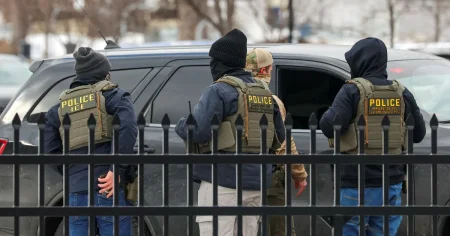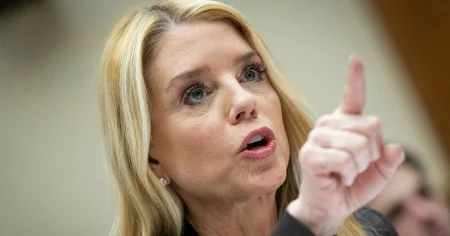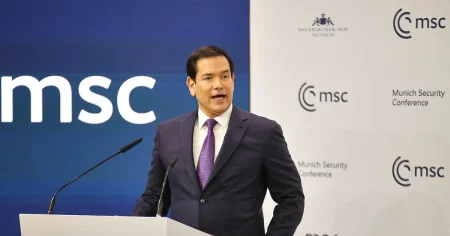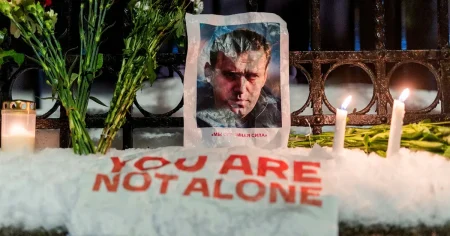Evelin Vásquez, a 29-year-old Guatemalan woman, embarked on the final leg of her journey to the United States with her three young children, hoping to find asylum and reunite with her husband working in California. Early one Monday morning, they crossed the Paso del Norte International Bridge from Ciudad Juárez, Mexico, to El Paso, Texas. Evelin had secured an appointment with U.S. Customs and Border Protection (CBP) to formally apply for asylum. However, upon arrival, she discovered that her appointment, along with countless others, had been abruptly canceled due to newly reinstated Trump administration policies. Instead of finding refuge, Evelin and her children were turned back to Mexico, stranded in a precarious limbo with no clear path forward.
The sudden policy shift, part of a broader crackdown on immigration under the reinstated Trump presidency, left Evelin and countless other migrants in a state of shock and despair. The cancellation of appointments booked through the CBP One app, a system designed to manage asylum applications, left many who had waited months, even years, for their chance to plead their case, stranded at the border. The app, while criticized by both immigrant advocates for its unreliability and by Trump supporters for allegedly facilitating abuse of the system, had provided a legal avenue for over 936,000 individuals to enter the U.S. in the preceding two years. Its closure forced many desperate asylum seekers into the hands of cartels and human smugglers, the very dangers they were trying to escape.
Evelin, now taking shelter at the El Buen Samaritano shelter in Ciudad Juárez, grapples with uncertainty and the heartbreak of dashed hopes. Her children, particularly her eldest daughter, understand the gravity of their situation, adding to Evelin’s emotional burden. Fear of returning to Guatemala, where they faced extortion before fleeing, compounds their predicament. While her husband urges patience from California, the family is adrift, caught between the dangers of their homeland and the closed doors of their hoped-for sanctuary. Evelin’s story mirrors the plight of countless other migrants, some of whom, like Kimberly Jimena from Honduras, had invested their life savings and taken out substantial loans to reach the U.S., only to be turned away.
The El Buen Samaritano shelter, overseen by Methodist pastor Juan Fierro, has become a refuge for these stranded migrants, bearing witness to the widespread shock, anger, and confusion following the abrupt policy change. Pastor Fierro laments the pervasive misconception fueled by Trump’s rhetoric, portraying all migrants as criminals, overlooking the many who seek only to work hard and contribute to American society. The shelter, already strained, faces increasing pressure as the border city of Ciudad Juárez grapples with the influx of migrants from around the globe. The city, historically a transit point for those seeking entry into the U.S., has seen a rise in tensions between locals and migrants, with some residents expressing resentment over perceived competition for jobs and resources.
Ciudad Juárez, caught in the crosshairs of the U.S. immigration debate, is bracing for further challenges. Local authorities, aware of the Trump administration’s plans to deploy thousands of troops to the border and potentially initiate mass deportations, are proactively preparing for the potential influx of returning Mexican citizens. They are establishing new tent camps and strengthening resources, drawing on lessons learned from previous immigration surges. Santiago Gonzalez Reyes, who leads the city’s humanitarian efforts for migrants, maintains close contact with the Mexican government, emphasizing their commitment to managing the situation in an orderly manner. While acknowledging the potential for initial chaos, he expresses confidence in their preparedness and anticipates a eventual stabilization.
Despite the reinforced border security and the amplified anti-immigrant rhetoric, the human desire for a better life endures, driving some to seek alternative, often dangerous, routes. One woman, found waiting under the scorching sun near the border wall, plans to cross illegally under the cover of darkness, highlighting the desperation that fuels irregular migration. Gonzalez Reyes believes that migration, regardless of political posturing, is a constant, an undeniable force fueled by hope and necessity. He, along with Pastor Fierro and Evelin Vasquez, echoes a plea for understanding and compassion, urging recognition of the shared humanity of those seeking refuge and opportunity. Evelin’s simple wish – to build a good life for her family – encapsulates the universal aspirations driving migration, challenging the divisive narratives that dominate the political landscape.



